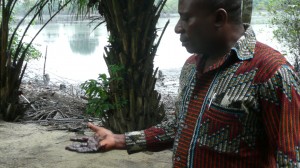By Peter Kostishack, Director of Programs
|
|
We received uplifting, if imperfect, news from Nigeria yesterday: Shell has agreed to pay $84 million (U.S.) for two oil spills in 2008 that devastated land, water, and health in the Niger Delta community of Bodo. Read the BBC News report.
But this victory for the people of Bodo accounts for just two of countless spills in the Niger Delta, which amount the equivalent of one Exxon Valdez spill per year. It is only a fraction of the compensation due to the Ogoni people and should be accompanied by a massive, long-term effort to clean up the soil, mangroves, and waterways.
If the costs of this are on par with what BP has spent in fines and compensation on the Deepwater Horizon spill, tens of billions will need to be invested in cleaning up and compensating communities in the Niger Delta. May this be just the beginning.
“The fishermen cannot hope to return to fishing in the Bodo rivers and creeks because of the depth of hydrocarbon pollution resulting from the oil spills. Although the amount being offered each fisherman is better than the pittance that Shell initially offered to pay, this can hardly purchase a good fishing boat and equipment necessary to return to the fishing business that the people know best.”
-Nnimmo Bassey, Global Greengrants’ Board Chair and Grants Advisor in West Africa (via Health of Mother Earth Foundation)
I visited Bodo City in August 2011. Terry Odendahl, Abdulai Darimani and Nnimmo Bassey of Global Greengrants West Africa Advisory Board, members of the Ogoni Solidarity Forum, and I had the opportunity to meet with the council of Chiefs, led by King Felix Sunday Bebor Berebon. The community had begun legal proceedings against Shell in April of that year, and just days before our visit, Shell had accepted responsibility for the two 2008 spills. There was some optimism that compensation would follow—as it finally has, more than six years after the spills.
We walked through the village and down to the waterfront, where dozens of wooden fishing boats were tied up on the shore. Children played in the boats while curiously watching us outsiders.
Instead of a vibrant fishing port, however, the boats that came into port were filled with oil-soaked fuelwood that people were harvesting from the mangroves that were dying from the oil pollution. The water was too toxic for aquatic life, and people had given up fishing because their boats couldn’t travel far enough to find fishable waters.
We also visited the neighboring village of Goi. This had been a productive farming and fishing community but had been completely abandoned because repeated oil spills had destroyed the water and the soil. All of the families had been forced to leave. Some land owners had taken their case against Shell to the Hague.
At the time, UNEP had recently released its report on oil pollution in Ogoniland that had been financed by Shell.
The study of nearly 50 sites found oil pollution up to a depth of 5 meters in soil. In the water, hydrocarbon levels were 1,000 times above Nigerian standards. It stated that Shell had not met minimum environmental standards for its operations in Nigeria.
UNEP recommended establishing an Environmental Restoration Fund with an initial investment of $1 billion from the government and oil companies, something that still has not been done.
Justice is long overdue, but the hard-fought Bodo decision is a step in the right direction that may pose an opportunity for other communities to receive significant compensation for environmental damages.
In an email yesterday, Nnimmo told us:
“It has been a tough struggle and we are happy with this outcome. Although it could have been better. I see opportunities for [Global Greengrants] grantees to bring up new cases against Shell and other oil companies in the region using this as a precedent. It will also give force to the demand for the cleanup of Ogoni environment. Now is the time to tune up the pressure!!”

